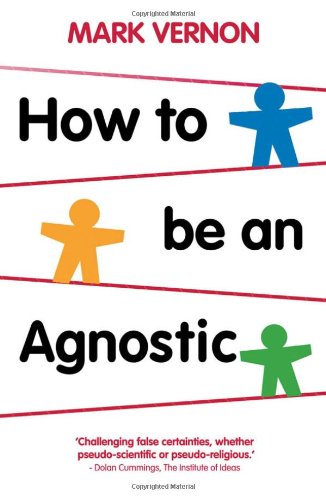Book review: How To Be An Agnostic
by Marc Vernon
★★★★★
Mark Vernon is a former Anglican priest who flirted with atheism after leaving the church, and finally settled on a “more satisfying” compromise of agnosticism. He found atheism, with its dogmatic certainty and sometime hostility to the beliefs of others, to be no more open-minded than religion. Besides, he says, religion is not just a set of beliefs or a moral code. It is a way of seeing the world and a way of approaching what’s unknown. So, is there higher ground in the middle, halfway between theists and atheists?
Vernon is no shoulder-shrugging agnostic, self-labeled because of a confessed disinterest in contemplating the Infinite. Nor does Vernon settle for “spiritual but not religious.” That’s simply not enough. A proper agnostic doesn’t dodge the hard questions, yet leaves room for spirituality and awe. Says Vernon, “A spirituality-inclined agnostic is like being a believer to this extent: we are individuals who think that God is not a silly question, as the conviction atheist must have concluded, but rather one that our experience demands we keep asking. To put it more concisely: for us, God is not the answer, but the pressing spiritual question. But can God still be thought of as the question, in a mystery-dissolving age of science and certainty? It depends on what you mean by God.”
So this book is not a search for God, but a search for the proper question. That is How To Be An Agnostic, and Vernon does it well. He writes intelligently, philosophically, and with a deep respect for past thinkers dating back to Socrates (who gets quite a bit of press time). The book’s childish cover and title notwithstanding, this is a serious and thoughtful exploration … even a little overwhelming. I can wade through mathematical treatises, but diving too deeply into the magnificence of our creation wears me down. Still, it is this very beauty and complexity … coupled with the key question, “why is there something instead of nothing” … which stirs the spirit of a serious agnostic.
Beware: There are no answers herein. The book meanders gently into the sunset by the final page, content to exit with a few words of agnostic instruction, but without a conclusion. That is, of course, the point.












 354 Circles
354 Circles
 603 Goodreads Friends & Fans
603 Goodreads Friends & Fans

 Hello! I'm an author, historical Jesus scholar, book reviewer, and liberal Christian, which means I appreciate and attempt to exercise the humanitarian teachings of Jesus without getting hung up on any particular supernatural or religious beliefs.
The Bible is a magnificent book that has inspired and spiritually fed generations for thousands of years, and each new century seems to bring a deeper understanding of life’s purpose. This is true of not only Christianity; through the years, our age-old religions are slowly transforming from superstitious rituals into humanitarian philosophies. In short, we are growing up, and I am thrilled to be riding the wave.
I avidly read all thought-provoking religion titles. New authors: I'd love to read and review your book!
Hello! I'm an author, historical Jesus scholar, book reviewer, and liberal Christian, which means I appreciate and attempt to exercise the humanitarian teachings of Jesus without getting hung up on any particular supernatural or religious beliefs.
The Bible is a magnificent book that has inspired and spiritually fed generations for thousands of years, and each new century seems to bring a deeper understanding of life’s purpose. This is true of not only Christianity; through the years, our age-old religions are slowly transforming from superstitious rituals into humanitarian philosophies. In short, we are growing up, and I am thrilled to be riding the wave.
I avidly read all thought-provoking religion titles. New authors: I'd love to read and review your book!
 Hi! While Lee writes the articles and reviews the books, I edit, organize, and maintain the blog. The views expressed here are Lee's but I'm his biggest supporter! :-)
Hi! While Lee writes the articles and reviews the books, I edit, organize, and maintain the blog. The views expressed here are Lee's but I'm his biggest supporter! :-)
Connect With Me!